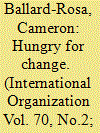| Srl | Item |
| 1 |
ID:
147081


|
|
|
|
|
| Summary/Abstract |
What drives autocrats to default on their sovereign debt? This article develops the first theory of sovereign debt default in autocracies that explicitly investigates survival incentives of political actors in nondemocracies. Self-interested elites, fearful of threats to their tenure because of urban unrest, may be willing to endure the long-term borrowing costs that defaulting creates rather than risk the short-term survival costs of removing cheap food policies for urban consumers. I test my main claims that both urbanization and food imports should be associated with greater likelihood of autocratic default using panel data covering forty-three countries over fifty years, finding that autocracies that are more reliant on imported food and that are more urbanized are significantly more likely to be in default on their external sovereign debt. I emphasize the regime-contingent nature of these effects by demonstrating that they are reversed when considering democratic sovereign default. I also substantiate the mechanisms put forward in my theory through illustrative historical cases of sovereign debt default in Zambia and Peru, in which I demonstrate that fear of urban unrest in the face of rapidly increasing food prices did indeed drive autocratic elites to default on international debt obligations. In addition to providing the first political theory of debt default in autocracies, the article introduces two robust predictors of autocratic default that have been overlooked in previous work, and highlights the importance of urban-rural dynamics in nondemocratic regimes.
|
|
|
|
|
|
|
|
|
|
|
|
|
|
|
|
| 2 |
ID:
097841


|
|
|
|
|
| Publication |
2010.
|
| Summary/Abstract |
This paper analyzes and assesses the "Principles for Stable Capital Flows and Fair Debt Restructuring in Emerging Markets," which have emerged as an important instrument for crisis prevention and crisis resolution in the international financial system. The paper argues that, notwithstanding their low profile, the Principles which were jointly agreed between key sovereign debtors and their private creditors in 2004 have proved to be a useful instrument in spite of their voluntary and non-binding nature. Indeed, an increasing number of sovereign debtors and private creditors have adopted the Principles' recommendations on transparency and the timely flow of information, close dialogue, "good faith" actions, and fair treatment. The paper, taking a rational choice perspective, appraises the Principles as the product of a transnational public-private partnership as well as a soft mode of governance. Moreover, it shows how the Principles have moved somewhat along the continuum of soft law and hard law toward the latter. Finally, the paper makes the case that the Principles and their design features can provide some lessons for the current international policy debate on codes of conduct in global financial regulation.
|
|
|
|
|
|
|
|
|
|
|
|
|
|
|
|